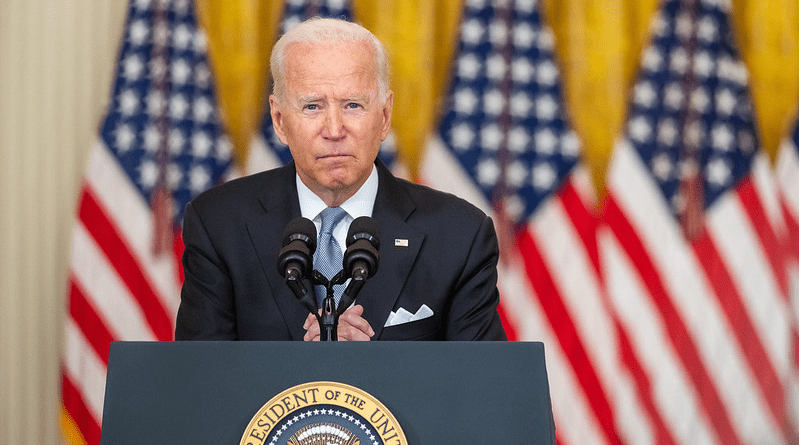Biden Ignores Asia’s Fading Religious Freedom – OpEd
By UCA News
By Ben Joseph
(UCA News) — US President Joe Biden’s maiden Asia visit this week offered nothing substantial to the vast continent’s besieged religious and ethnic minorities, not to mention those struggling for democracy and human rights. Many would now agree that under the changed circumstances it may be unrealistic to look to the US to defend such rights.
Biden concluded his five-day visit to South Korea and Japan on May 24. His trip to Asia — the birthplace of five world religions — took place amid complaints of increasing religious extremism and fascist trends in the world’s largest continent, which holds 60 percent of humanity on about 30 percent of the Earth’s land area.
Millions of Asians are in dire need of freedom of religion and expression; many naturally expected the US president to speak out in defense of their rights. Asia’s status as the mother of world religions is becoming undone as battle lines are drawn between leading Asian religions with no end in sight.
The oldest among the three Abrahamic religions — Judaism — is on fighting terms with Islam, which has the largest following on the continent. People of non-Islamic religions, including Christians, are treated as second-class citizens in almost all Muslim-majority Asian nations, and in most parts Christians are additionally tagged as “agents of the West.”
Hinduism in India is now growing less tolerant toward Islam and Christianity. Buddhism, which swears by non-violence, finds enemies in religious minorities in Sri Lanka and Myanmar. Standing aloof is Confucianism in atheist China. That is because of the “right man in the wrong place” syndrome.
Fanatical groups and fringe elements have sprung up in large numbers in many Asian nations, destroying religious freedom and crippling democratic rights such as free expression. In many South Asian nations, such groups roam free and act with complete impunity as sidekicks of those in power. At times their actions turn bloody and ugly.
Ethnic minorities are passing through the worst phase in many Asian nations. Things have reached a stage where they have to shed their ethnicity to survive. Tibetans and Uyghurs in China, Rohingya in Myanmar, Belushis in Pakistan, Kurds in the Middle East, and Tamils in Sri Lanka have to live with state-sponsored repression.
Biden, a Catholic and president of a country once known as a defender of democratic rights and religious freedom, chose to ignore controversial issues and remained keenly focused on a single aspect — consolidating the support of its allies in facing Chinese challenges in trade and security.
The visit made Asian media discuss possible US reaction to Chinese aggression in a manner similar to Russia invading Ukraine. Biden indicated a fierce US response in case China breaches the international order. But he took care not to mention religious and rights violations.
Human rights violations against Uyghurs resulted in the diplomatic boycott of the Beijing Winter Olympics in February. However, when in Asia, Biden was tight-lipped about the alleged disciplinary vocational program run by China to make the Uyghurs fall in line.
His Asia visit took place as two elected leaders in Asia — Imran Khan in Pakistan and Mahindra Rajapakse in Sri Lanka — were sent packing, with their places taken by interim governments.
Many of the ASEAN nations whom Biden hosted in Washington before his Asia trip have displayed their dislike of democracy time and again.
Some of the leading democracies like India have turned to elected autocracies as cited by reputed institutions in the West. The pro-democracy movement in Hong Kong has been almost quelled by China.
Democracy and the right to dissent are vastly shrinking in Asia. Human rights organizations, civil society, the media and charity organizations are finding it difficult to champion the common man’s causes.
In South Asia, Christian charity organizations have their wings clipped as governments make it difficult for them to secure external aid. Activists and journalists are jailed for crossing swords with authorities.
Biden had little to say on these issues but appeared more concerned by the threat posed by North Korea and speculation that Pyongyang could conduct a nuclear test soon.
Less than two weeks into office, new South Korean President Yoon Suk-yeol got an offer from Biden of a possible deployment of “strategic assets” — a term referring to bombers, submarines and aircraft carriers — to deter North Korea.
If the proposal is implemented, the chances of reviving the stalled nuclear talks between the US and North Korea are dim. Of course, he did warn Kim Jong-un against aggression toward South Korea and Japan. But, unlike previous presidents, he did not visit the Korean demilitarized zone, the heavily armed border that separates the two Koreas.
In Japan, where Biden spent three days, the vital focus was the Quad meeting involving the US, India Australia and Japan. The four-nation security grouping stands for the US-sponsored rules-based order to contain China in the Indo-Pacific.
“We’ve shown that Quad is not just a passing fad, we mean business. We’re here to get things done for the region …,” Biden said.
At the Quad meeting, Biden warned Russia and said the Ukraine conflict had undoubtedly touched the entire world. “This is more than just a European issue,” he said.
However, the life-threatening issues of millions of Asians somehow failed to get even a mention. Biden’s agenda seems to be focused on taming China as the US-led NATO allies are busy simultaneously taking on Russia and China.
The lives of the poor are cheaper, no matter from where you look at it.
* The views expressed in this article are those of the author and do not necessarily reflect the official editorial position of UCA News.

